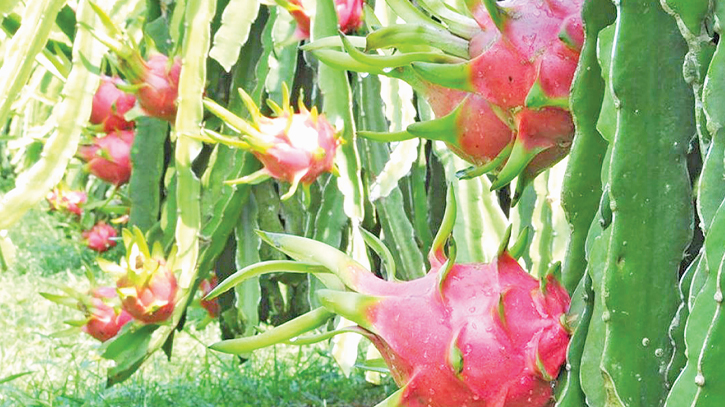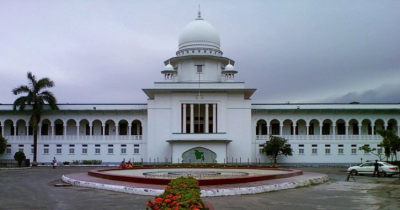
The increasing demand for this exotic fruit has led to the expansion of dragon fruit cultivation in Manikganj, with entrepreneurs showing keen interest in its production. Photo: MESSENGER
Dragon fruit, also known as pitaya, was once relatively unknown in Bangladesh, but it is now gaining popularity among farmers in Manikganj and across the country. The increasing demand for this exotic fruit has led to the expansion of dragon fruit cultivation in the region, with entrepreneurs showing keen interest in its production.
Noor Mohammad, a 45-year-old farmer from Rajibpur village in Sadao upazila of Manikganj, has created a stunning dragon fruit garden adjacent to his home. He embarked on this journey by planting 6,000 dragon seedlings on just 105 percent of his land. In just two years, he has generated approximately 18 lakh rupees in revenue from his dragon fruit harvest on this land and continues to plant more. Noor Mohammad is also considering selling dragon fruit saplings, which could further boost his profits.
The growing popularity of dragon fruit has prompted individuals from various parts of the country to visit Noor Mohammad to obtain saplings for their own fruit gardens and rooftop setups.
His success in dragon fruit cultivation has not only made him economically self-sufficient but has also contributed significantly to the agricultural sector in his upazila.
Noor Mohammad explained that he initially cultivated milk and guava but was inspired to venture into dragon fruit farming after receiving advice from a farmer in Rajshahi. In October 2021, he purchased 6,000 saplings for Tk 50 each and invested an additional Tk 2 lakh in land preparation, including organic and chemical fertilizers and manure. Overall, his investment in dragon fruit cultivation has amounted to around five to five and a half lakh rupees.
Eight months after planting the dragon fruit, the plants begin to produce abundant flowers, leading to his first sale of dragon fruit worth approximately Tk 3 lakh. These dragon fruits typically weigh between 700 to 800 grams each, and Noor Mohammad sells them at a wholesale price of Tk 300 per kilogram. Customers from various regions of Bangladesh flock to his garden to purchase dragon fruit, resulting in sales of about 18 lakhs in the last two years. This year, he plans to expand his business by selling dragon fruit saplings.
When asked about the fruit's availability throughout the year, Noor Mohammad noted that dragon fruiting continues for eight months, with a brief pause during the winter season. Fruits can be harvested every 15 days, making it a consistent source of income.
Noor Mohammad has also noticed educated young farmers in the area taking an interest in dragon fruit gardening, seeking his guidance and advice. He emphasizes the importance of regular care and maintenance of the dragon fruit trees.
Md. Saiful Islam, Deputy Assistant Agriculture Officer in Rajibpur, highlighted the nutritional value, size, shape, and market demand for dragon fruit. He mentioned that the resilience of dragon fruit plants against diseases, being cactus plants, makes cultivation relatively easy. Many farmers, inspired by individuals like Noor Mohammad, have started commercial dragon fruit farming with the support of the agriculture department.
Biplab Hossain Salim, Chairman of Krishnapur Union Parishad, lauded the profitability of dragon farming compared to other crops, emphasizing the quick fruiting cycle and the success of Noor Mohammad's dragon garden, which has inspired others to join the dragon fruit farming trend.
Messenger/Disha








